Related Research Articles
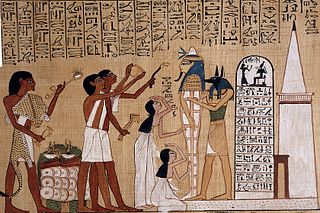
A funeral is a ceremony connected with the final disposition of a corpse, such as a burial or cremation, with the attendant observances. Funerary customs comprise the complex of beliefs and practices used by a culture to remember and respect the dead, from interment, to various monuments, prayers, and rituals undertaken in their honor. Customs vary between cultures and religious groups. Funerals have both normative and legal components. Common secular motivations for funerals include mourning the deceased, celebrating their life, and offering support and sympathy to the bereaved; additionally, funerals may have religious aspects that are intended to help the soul of the deceased reach the afterlife, resurrection or reincarnation.

Halloween or Hallowe'en, less commonly known as Allhalloween, All Hallows' Eve, or All Saints' Eve, is a celebration observed in many countries on 31 October, the eve of the Western Christian feast of All Hallows' Day. It begins the observance of Allhallowtide, the time in the liturgical year dedicated to remembering the dead, including saints (hallows), martyrs, and all the departed.
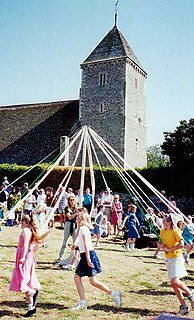
May Day is a public holiday, in some regions, usually celebrated on 1 May or the first Monday of May. It is an ancient festival marking the first day of summer, and a current traditional spring holiday in many European cultures. Dances, singing, and cake are usually part of the festivities.

Trick-or-treating is a traditional Halloween custom for children and adults in some countries. In the evening before All Saints' Day, children in costumes travel from house to house, asking for treats with the phrase "Trick or treat". The "treat" is usually some form of candy, although in some cultures money is given instead. The "trick" refers to a threat, usually idle, to perform mischief on the homeowner(s) or their property if no treat is given. Trick-or-treating usually occurs on the evening of October 31. Some homeowners signal that they are willing to hand out treats by putting up Halloween decorations outside their doors; others simply leave treats available on their porches for the children to take freely. Houses may also leave their porch light on as a universal indicator that they have candy.

The Yule log, Yule clog, or Christmas block is a specially selected log burnt on a hearth as a Christmas tradition in regions of Europe, particularly the United Kingdom, and subsequently North America. The origin of the folk custom is unclear. Like other traditions associated with Yule, the custom may ultimately derive from Germanic paganism.

Michaelmas is a Christian festival observed in some Western liturgical calendars on 29 September. In some denominations a reference to a fourth angel, usually Uriel, is also added. Michaelmas has been one of the four quarter days of the financial, judicial, and academic year.

Saturnalia was an ancient Roman festival and holiday in honour of the god Saturn, held on 17 December of the Julian calendar and later expanded with festivities through to 23 December. The holiday was celebrated with a sacrifice at the Temple of Saturn, in the Roman Forum, and a public banquet, followed by private gift-giving, continual partying, and a carnival atmosphere that overturned Roman social norms: gambling was permitted, and masters provided table service for their slaves as it was seen as a time of liberty for both slaves and freedmen alike. A common custom was the election of a "King of the Saturnalia", who would give orders to people, which were to be followed and preside over the merrymaking. The gifts exchanged were usually gag gifts or small figurines made of wax or pottery known as sigillaria. The poet Catullus called it "the best of days".

A jack-o'-lantern is a carved turnip, pumpkin or other root vegetable lantern, commonly associated with the Halloween holiday. Its name comes from the reported phenomenon of strange lights flickering over peat bogs, called will-o'-the-wisps or jack-o'-lanterns. The name is also tied to the Irish legend of Stingy Jack, a drunkard who bargains with Satan and is doomed to roam the Earth with only a hollowed turnip to light his way.

The Haxey Hood is a traditional event in Haxey, North Lincolnshire, England, on 6 January, the Twelfth Day of Christmas.
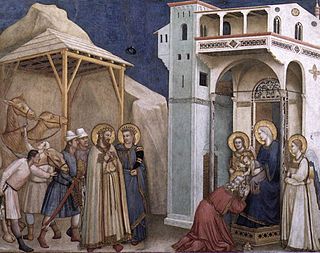
The Twelve Days of Christmas, also known as Twelvetide, is a festive Christian season celebrating the Nativity of Jesus. In some Western ecclesiastical traditions, "Christmas Day" is considered the "First Day of Christmas" and the Twelve Days are 25 December to 5 January, inclusive, with 6 January being a "thirteenth day" in some traditions and languages. However, 6 January is most often considered Twelfth Day/Twelfth Night with the Twelve Days "of" Christmas actually after Christmas Day from 26 December to 6 January. For many Christian denominations—for example, the Anglican Communion and Lutheran Church—the Twelve Days are identical to Christmastide, but for others, e.g., the Roman Catholic Church, Christmastide lasts longer than the Twelve Days of Christmas.

Restoration Day, more commonly known as Oak Apple Day or Royal Oak Day, was an English public holiday, observed annually on 29 May, to commemorate the restoration of the English monarchy in May 1660. In some parts of the country the day is still celebrated. It has also been known as Shick Shack Day, or Oak and Nettle Day.
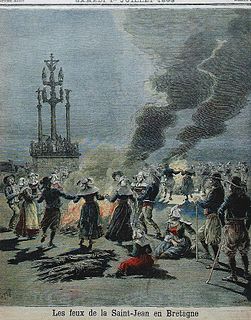
Saint John's Eve, starting at sunset on 23 June, is the eve of celebration before the Feast Day of Saint John the Baptist. The Gospel of Luke states that John was born six months before Jesus; therefore, the feast of John the Baptist was fixed on 24 June, six months before Christmas according to the old Roman calculation. This feast day is one of the very few saints' days which commemorates the anniversary of the birth, rather than the death, of the saint being honored.

Setsubun is the day before the beginning of spring in the old calendar in Japan. The name literally means 'seasonal division', referring to the day just before the first day of spring in the traditional calendar, known as Setsubun; though previously referring to a wider range of possible dates, Setsubun is now typically held on February 3, with the day after – the first day of spring in the old calendar – known as Risshun. Both Setsubun and Risshun are celebrated yearly as part of the Spring Festival in Japan. In its association with the Lunar New Year, Setsubun, though not the official New Year, was thought of as similar in its ritual and cultural associations of 'cleansing' the previous year as the beginning of the new season of spring. Setsubun was accompanied by a number of rituals and traditions held at various levels to drive away the previous year's bad fortunes and evil spirits for the year to come.
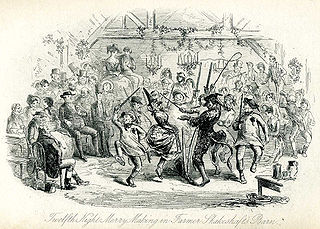
Twelfth Night is a festival in some branches of Christianity that takes place on the last night of the Twelve Days of Christmas, marking the coming of the Epiphany. Different traditions mark the date of Twelfth Night as either 5 January or 6 January, depending on whether the counting begins on Christmas Day or 26 December.

Confetti are small pieces or streamers of paper, mylar, or metallic material which are usually thrown at celebrations, especially parades and weddings. The origins are from the Latin confectum, with confetti the plural of Italian confetto, small sweet. Modern paper confetti trace back to symbolic rituals of tossing grains and sweets during special occasions, traditional for numerous cultures throughout history as an ancient custom dating back to pagan times, but adapted from sweets and grains to paper through the centuries.
Plate smashing is a Greek custom involving the smashing of plates or glasses during celebratory occasions. In popular culture, the practice is most typical of foreigners' stereotypical image of Greece, and while it occurs more rarely today, it continues to be seen on certain occasions, such as weddings, although plaster plates are more likely to be used.

A soul cake, also known as a soulmass-cake, is a small round cake which is traditionally made for Halloween, All Saints' Day and All Souls' Day to commemorate the dead in many religions traditions. The cakes, often simply referred to as souls, are given out to soulers who go from door to door during the days of Allhallowtide singing and saying prayers "for the souls of the givers and their friends". The practice in England dates to the medieval period, and was continued there until the 1930s. In Sheffield and Cheshire, the custom has continued into modern times. In Lancashire and in the North-east of England soul cakes were known as Harcakes, a kind of thin parkin.
Serbian Christmas traditions are customs and practices of the Serbs associated with Christmas and a period encompassing it, between the third Sunday before Christmas Day and Epiphany. There are many, complex traditions connected with this period. They vary from place to place, and in many areas have been updated or watered down to suit modern living. The Serbian name for Christmas is Božić, which is the diminutive form of the word bog ("god"), and can be translated as "young god". Christmas is celebrated for three consecutive days, starting with Christmas Day, which the Serbs call the first day of Christmas. On these days, one is to greet another person by saying "Christ is Born," which should be responded to with "Truly He is Born," or in Serbian: "Hristos se rodi" [ˈxristɔs sɛ ˈrɔdi] – "Vaistinu se rodi" [ˈʋaistinu sɛ ˈrɔdi].
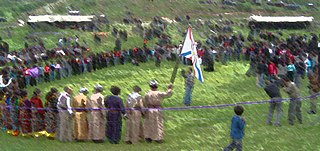
The culture of the Assyrians is both distinct from those of neighbouring ethnic groups as well as ancient. Many Assyrians still speak, read and write various Akkadian-influenced dialects of Eastern Aramaic, labelled by linguists as Northeastern Neo-Aramaic and Central Neo-Aramaic. They are predominantly adherents of several denominations of Syriac Christianity, notably the Ancient Church of the East, the Assyrian Church of the East, the Chaldean Catholic Church, the Syriac Catholic Church and the Syriac Orthodox Church. Some are followers of the Assyrian Pentecostal Church and Assyrian Evangelical Church. A minority are secular or irreligious.
English festivals are the Christian and secular festivals that are traditionally celebrated in England. Most festivals are observed throughout England but some, such as Oak Apple Day, Souling, Rushbearing, Bawming the Thorn and Hocktide are local to certain regions.
References
- 1 2 "push-penny" . Oxford English Dictionary (Online ed.). Oxford University Press. (Subscription or participating institution membership required.)
- 1 2 Walsh, William Shepard (1897-01-01). Curiosities of Popular Customs ... Illustrated.
- ↑ Durham Chronicle. 29 Nov 1872.
- ↑ The Antiquary. E. W. Allen. 1873-01-01.
- 1 2 3 Thiselton-Dyer, Thomas Firminger (1876). "British Popular Customs: Present and Past". archive.org. George Bell & Sons. Retrieved 2015-10-18.
- ↑ Sorabella, Jean (October 2001). "Monasticism in Western Medieval Europe". www.metmuseum.org. Retrieved 2015-10-18.